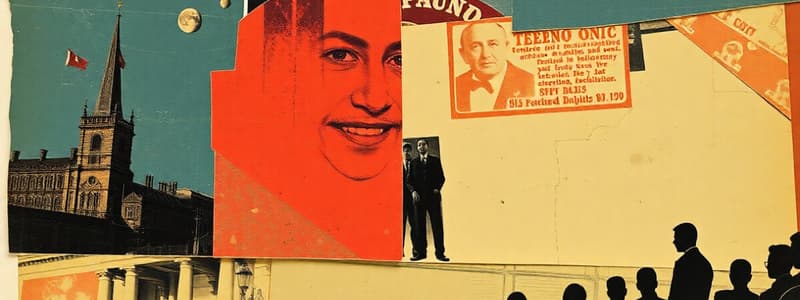Podcast
Questions and Answers
To prepare for the performance, we need to ______ our lines.
To prepare for the performance, we need to ______ our lines.
rehearse
The character's ______ was the highest point of the story.
The character's ______ was the highest point of the story.
climax
The author uses ______ to create tension and keep readers guessing.
The author uses ______ to create tension and keep readers guessing.
suspense
In a play, the ______ refers to the layout of the different scenes.
In a play, the ______ refers to the layout of the different scenes.
The ______ of the story provided insight into the characters' thoughts.
The ______ of the story provided insight into the characters' thoughts.
She felt ______ after receiving the disappointing news.
She felt ______ after receiving the disappointing news.
The plot twist left the audience feeling ______.
The plot twist left the audience feeling ______.
The piece was visually ______, drawing everyone's attention.
The piece was visually ______, drawing everyone's attention.
She was ______ at the way she was treated during the meeting.
She was ______ at the way she was treated during the meeting.
He decided to leave the situation because he was ______ with how things were going.
He decided to leave the situation because he was ______ with how things were going.
I prefer shows with a __________.
I prefer shows with a __________.
He's my favorite _________.
He's my favorite _________.
The _____________ is the person in charge of a theatre production.
The _____________ is the person in charge of a theatre production.
It's important to listen to the way people talk in real life to write _____________.
It's important to listen to the way people talk in real life to write _____________.
You need to _____________ your voice for the _____________ to hear you.
You need to _____________ your voice for the _____________ to hear you.
It's very exciting to watch actors _____________ in person.
It's very exciting to watch actors _____________ in person.
The text of a piece of drama is known as a __________.
The text of a piece of drama is known as a __________.
The ______ is the raised area in a theatre where actors perform.
The ______ is the raised area in a theatre where actors perform.
You won't be able to play your role well if you don't _____________ many times.
You won't be able to play your role well if you don't _____________ many times.
The ______ is the person who tells the story in a book, film, or play.
The ______ is the person who tells the story in a book, film, or play.
What a boring _____________!
What a boring _____________!
The ______ includes all the actors in a film or play.
The ______ includes all the actors in a film or play.
The ______ are clothes that actors wear during a performance.
The ______ are clothes that actors wear during a performance.
A good actor can _____________ a wide range of emotions.
A good actor can _____________ a wide range of emotions.
The written text of a film or play is known as the ______.
The written text of a film or play is known as the ______.
The ______ is the group of people who watch a play, film, or TV show.
The ______ is the group of people who watch a play, film, or TV show.
To ______ means to entertain people by acting, singing, or dancing.
To ______ means to entertain people by acting, singing, or dancing.
Stage ______ provide instructions on how actors should move and speak.
Stage ______ provide instructions on how actors should move and speak.
A ______ is a character played by an actor or actress.
A ______ is a character played by an actor or actress.
To ______ your lines is to memorize the words you have to say in a play.
To ______ your lines is to memorize the words you have to say in a play.
Flashcards are hidden until you start studying
Study Notes
Vocabulary List
- The list includes common vocabulary terms related to drama and theatre.
- The terms are presented in both English and Chinese, likely with pinyin transcription.
- The Chinese words may be approximations or transliterations due to the lack of context.
Matching Words and Definitions
- The table matches words related to theatre production with their definitions.
- Common theatrical terms include "cast", "director", "script", "audience", and "stage".
- Key concepts like "character", "narrator", and "scene" are also defined.
Exercise B: Fill in the Blanks
- The exercise focuses on vocabulary related to theatre production.
- It encourages understanding by applying the vocabulary to specific scenarios.
- For example, "The director is the person in charge of a theatre production."
- Other key terms include "cast", "dialogue", "audience", "perform", "script", "acts", "scenes", "rehearse", "setting", and "express".
- The exercise reinforces learning by using the vocabulary in context.
Studying That Suits You
Use AI to generate personalized quizzes and flashcards to suit your learning preferences.




